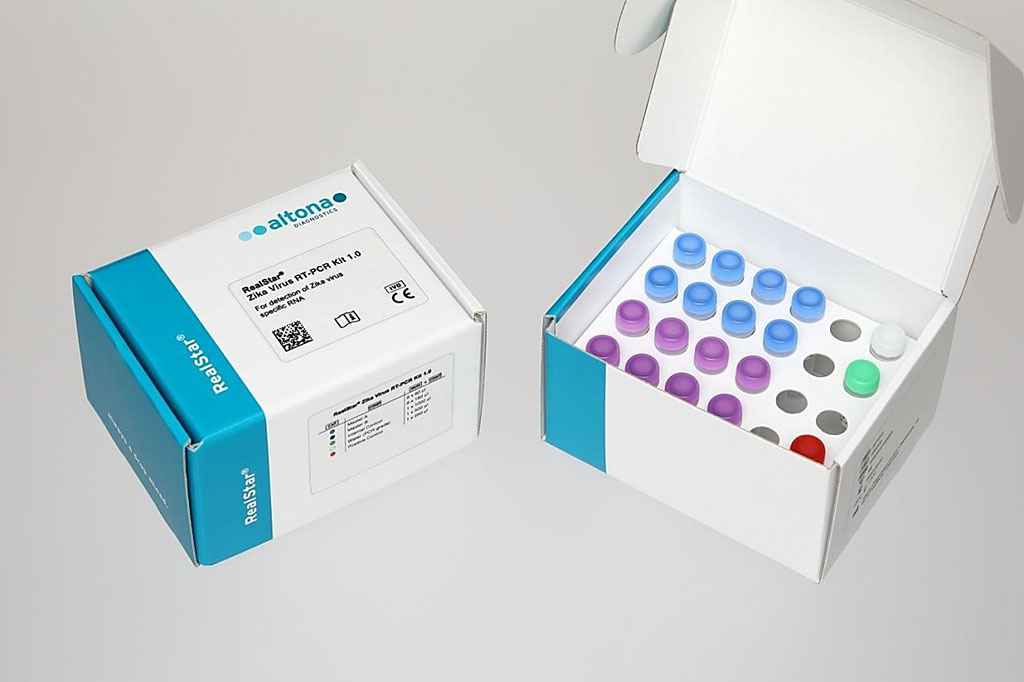Prolonged Maternal Zika Viremia Evaluated for Adverse Perinatal Outcomes
By LabMedica International staff writers
Posted on 10 Feb 2021
The recent worldwide epidemic confirmed maternal–fetal transmission of Zika virus (ZIKV) and its association with adverse perinatal outcomes, particularly severe central nervous system lesions and fetal losses.Posted on 10 Feb 2021
ZIKV is detectable in maternal blood by reverse transcription polymerase chain reaction (RT-PCR) during the acute phase of infection. ZIKV viremia usually lasts from two days before to 16 days after symptom onset. The median time of ZIKV RNA clearance is five days.

Image: The RealStar Zika Virus RT-PCR Kit 1.0 is an in vitro diagnostic test, based on real-time PCR technology, for the qualitative detection of Zika virus specific RNA in human serum or urine (Photo courtesy of Altona Diagnostics).
A team of medical scientists led by those at Lausanne University Hospital (Lausanne, Switzerland) carried out a prospective cohort study in French Guiana and enrolled Zika virus–infected pregnant women with a positive PCR result at inclusion and non-infected pregnant women; both groups underwent serologic testing in each trimester and at delivery during January–July 2016. Prolonged viremia was defined as ongoing virus detection >30 days post-infection.
The team performed molecular and serologic testing using the RealStar Zika Kit (Altona Diagnostics GmbH, Hamburg, Germany) for RT-PCR, in-house IgM and IgG antibody-capture ELISA, and microneutralization assays for serologic testing. The limit of detection for serum samples tested using the RealStar Zika Kit was 0.61 copies/μL (95% CI 0.39–1.27). A cycle threshold (Ct) value <37 was considered positive.
The team reported that adverse outcomes (fetal loss or neurologic anomalies) were more common in fetuses and neonates from mothers with prolonged viremia (40.0%) compared with those from infected mothers without prolonged viremia (5.3%, adjusted relative risk [aRR] 7.2 [95% CI 0.9–57.6]) or those from non-infected mothers (6.6%, aRR 6.7 [95% CI 3.0–15.1]). Congenital infections were confirmed more frequently in fetuses from mothers with prolonged viremia (9/15 [60.0%]) when compared with those from infected mothers without prolonged viremia (5/19 [26.3%], RR 2.3 [95% CI 1.0–5.4]) and non-infected mothers (0/332 [0.0%]).
The authors concluded that prolonged maternal ZIKV viremia could be a marker for an increased risk for maternal–fetal transmission and subsequent adverse perinatal outcomes. Even if prolonged maternal viremia is not consistently present in cases of congenital infection, it might reflect active viral replication in the fetal–placental compartment and should lead to an enhanced prenatal and neonatal follow-up. The study was published in the February 2021 issue of the journal Emerging Infectious Diseases.
Related Links:
Lausanne University Hospital
Altona Diagnostics GmbH














